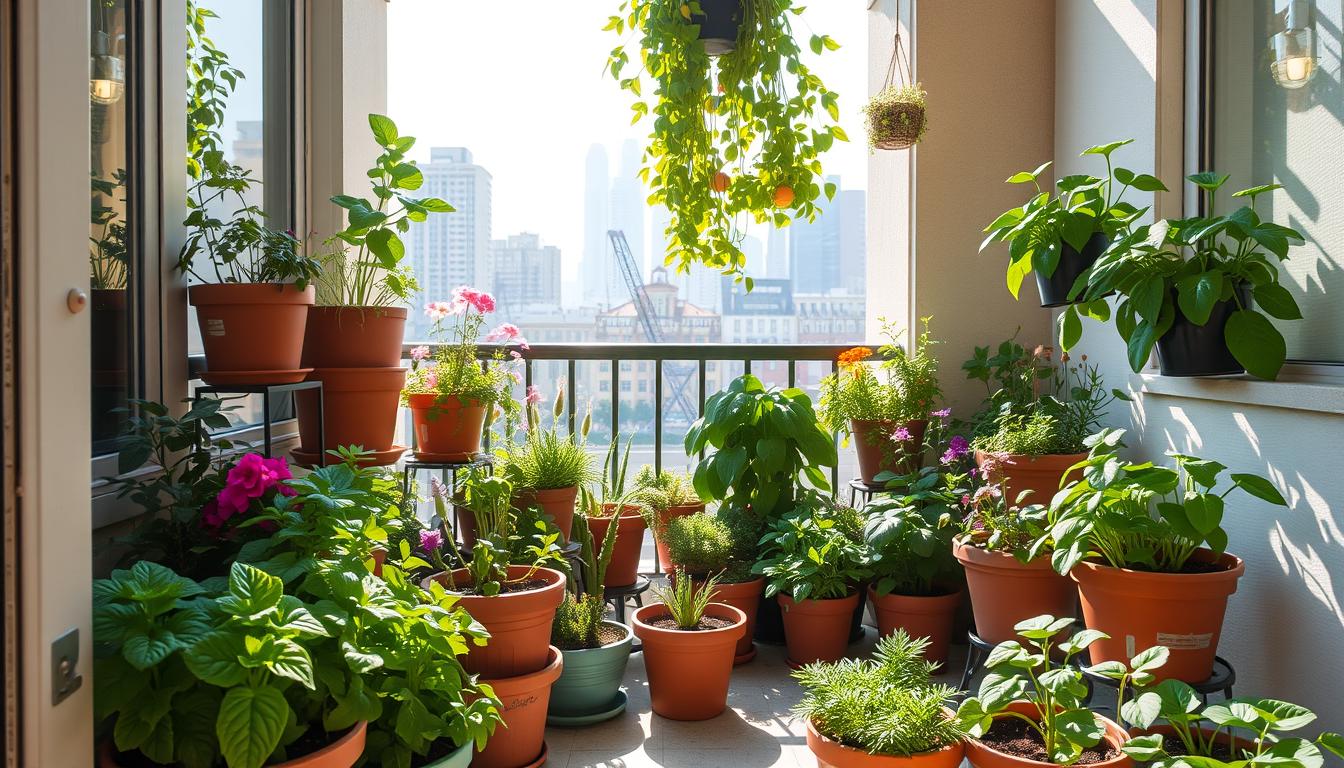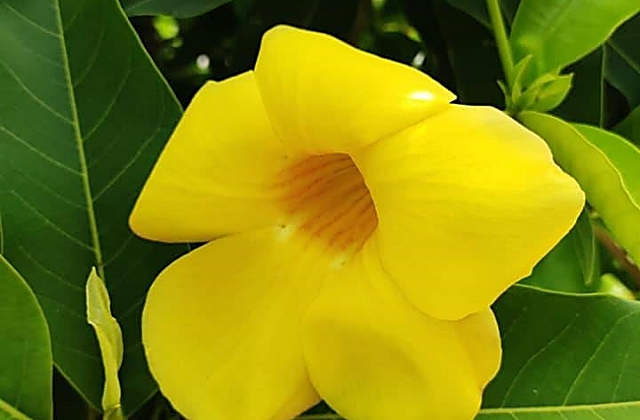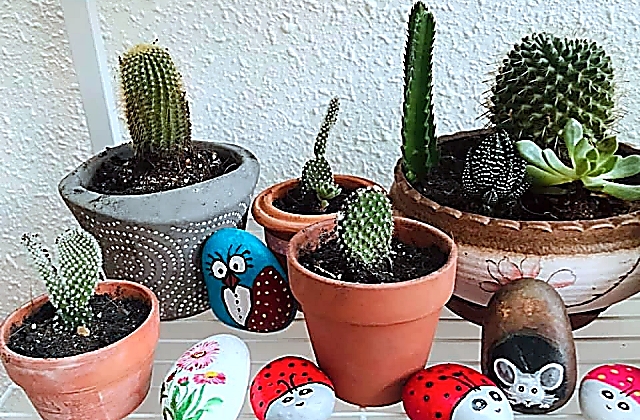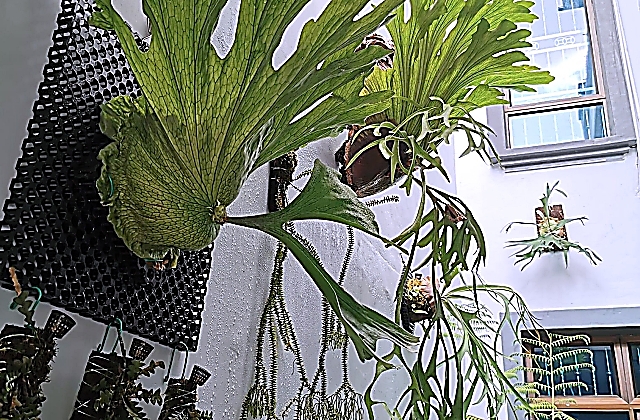Apartment Gardening For Beginners: Easy Tips & Tricks
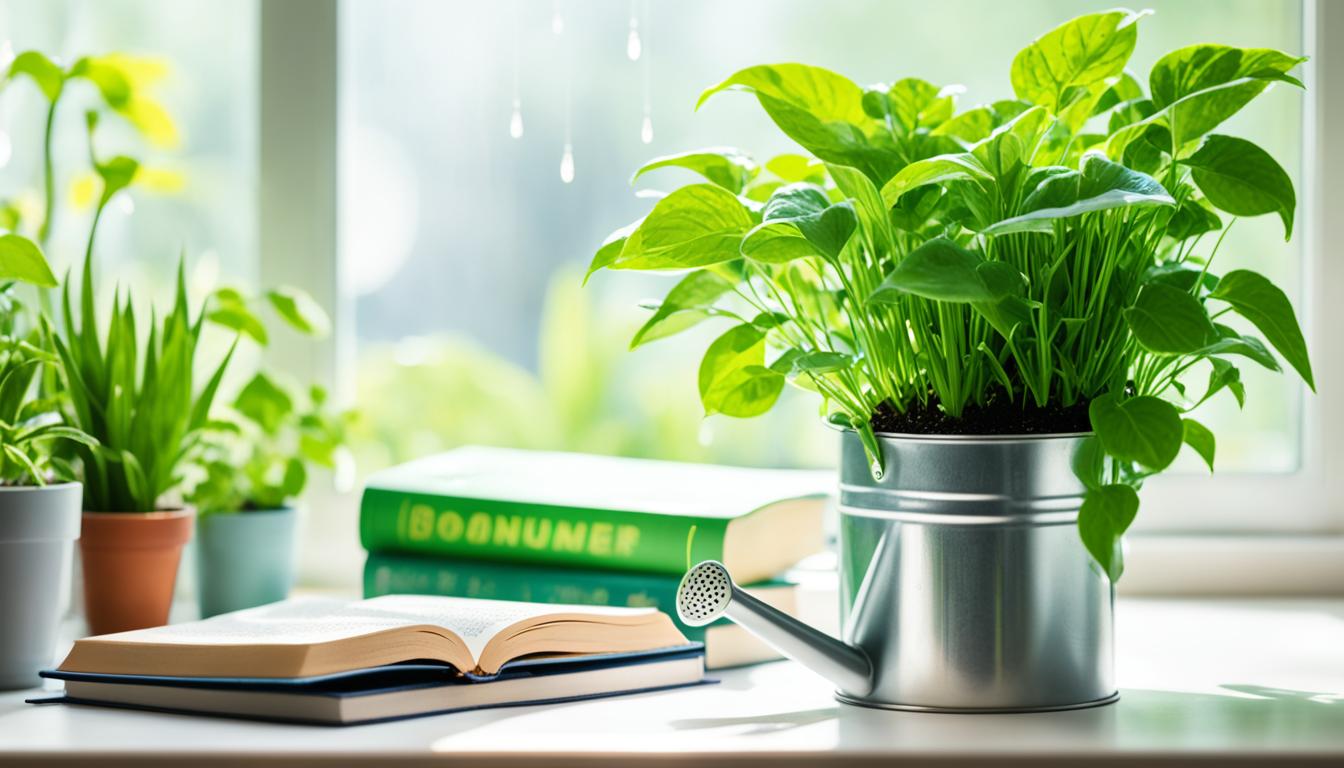
Are you tired of bare windowsills and empty balconies? You can still have a lush, vibrant oasis, even with a small living space. You can grow fresh herbs, colorful flowers, or juicy fruits right in your home. Learn how to start your apartment garden and enjoy its many benefits.
Key Takeaways
- Apartment gardening lets you grow herbs, vegetables, and fruits in small spaces.
- Think about sunlight, watering, and container size for successful indoor gardening.
- Choose low-maintenance plants and gardening methods for a thriving apartment garden.
- Apartment gardening boosts your health, improves air quality, and cuts down on food waste.
- Starting your apartment garden is easy with a few simple tips and tricks.
The Value of Apartment Gardening
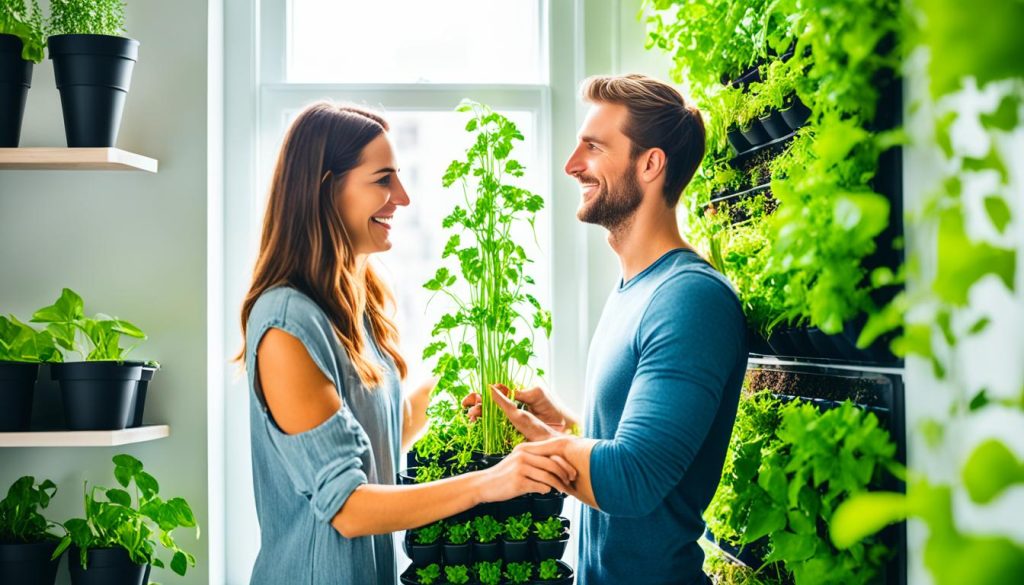
Apartment gardening brings many benefits to your health and well-being. It cleans the air and connects you with nature, even in the city. It helps reduce stress, increase productivity, and lower your carbon footprint.
Enhance Your Well-Being
Being around plants can make you feel better, lower stress, and help you work better. Gardening is good for your mind and heart. It can make you feel calm and happy.
Purify the Air
Some plants can make the air in your apartment cleaner by removing toxins like formaldehyde and benzene. NASA found plants like peace lilies and spider plants are great at this. Adding 3 to 6 of these plants can make your home’s air much cleaner.
Connect with Nature
Even in an apartment, you can feel close to nature by growing plants. Being near nature can lower your blood pressure and stress levels. Gardening in your apartment lets you enjoy these benefits and take care of your own plants.
Reduce Food Waste
Up to 50% of the fruits and veggies we buy get thrown away. Growing your own food in your apartment can cut down on waste. It gives you fresh produce and helps the planet by reducing the need for industrial farming and long food transport.
Apartment gardening has many benefits for your health and the environment. It improves your well-being, cleans the air, and helps fight climate change.
What to Plant in Your Apartment Garden
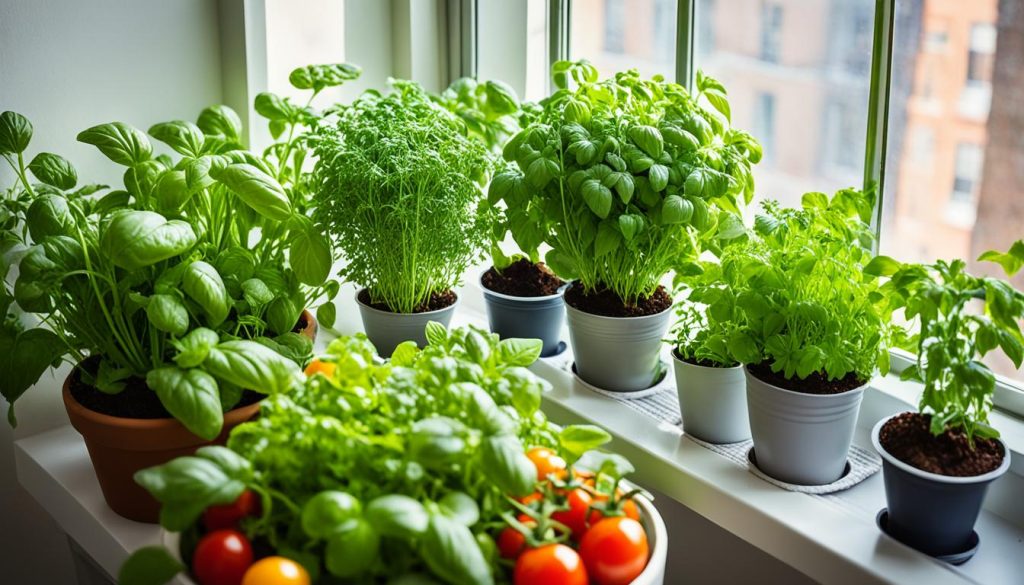
You can grow a great apartment garden even with limited space. You can enjoy fresh, homegrown produce. There are many plants you can grow, whether you’re new to gardening or have been doing it for years.
Herbs
Herbs are easy to grow in your apartment garden and are great for cooking. You can grow basil for pesto, chives for salads, mint for cocktails, and oregano for pasta. These plants do well in containers and need little care, perfect for apartment gardens.
Vegetables
Growing your own vegetables can be rewarding. You’ll get fresh ingredients for tasty side dishes and salads. Try growing carrots, scallions, radishes, tomatoes, and potatoes in small spaces.
Fruits
Fruit plants might need a bit more work in an apartment, but it’s doable. Dwarf citrus trees like lemons or limes can grow in containers and add flavor to your meals. For a sunny spot, grow strawberries for a summer treat. If you’re up for a challenge, try an avocado tree from a pit.
Microgreens
Microgreens are young, nutrient-rich greens harvested early. They’re perfect for apartment gardens because they grow and harvest quickly. These small greens are full of vitamins, minerals, and antioxidants, adding health and flavor to your food.
Adding herbs, vegetables, fruits, and microgreens to your apartment garden brings many benefits. You’ll enjoy growing your own food, improving your living space’s air quality, and adding beauty. With creativity and effort, your small garden can thrive and give you a lot of fresh produce.
Getting Started: Considerations for Apartment Gardening
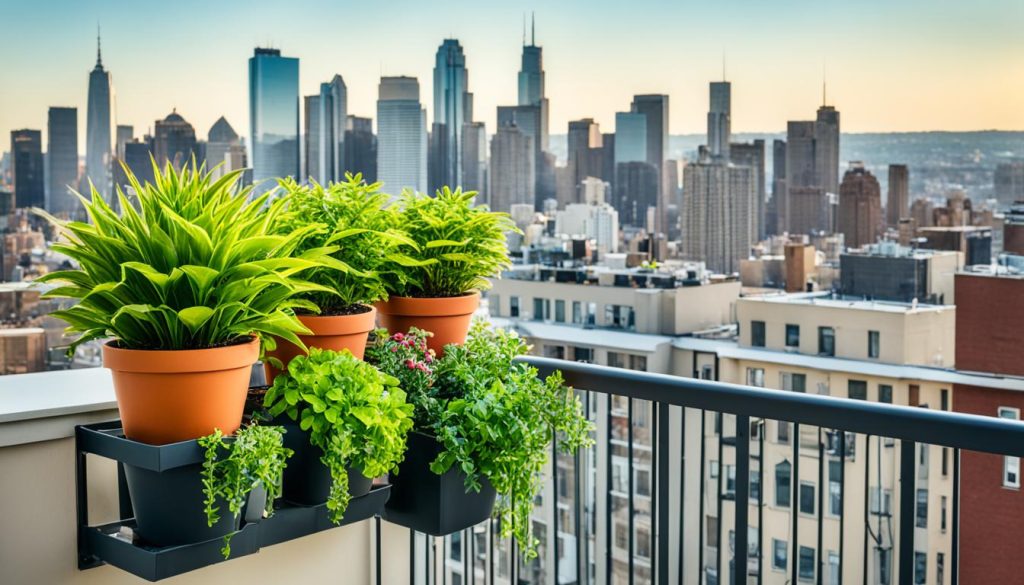
Before starting your apartment garden, think about a few important things. Make sure you have permission from your building or homeowners’ association to grow plants outside. Once you get the okay, you can plan your garden.
Space is limited in apartments, so check how much room you have. Think about how much space you can use for pots, planters, and vertical gardens. This will help you pick the right plants and arrange them well. Also, think about how much time you can spend on your garden. If you’re busy, plants like succulents are easy to care for.
It’s important to know how much light your apartment gets. Some plants need a lot of sun, while others prefer shade. Find the spots that get the most sunlight and pick your plants based on that.
The soil you use is key for your plants’ health. Look up what soil your plants need and be ready to add nutrients if necessary. Also, make sure you can easily water your plants without over or under watering them.
Think about how the seasons and your environment might affect your garden. Choose plants that can handle the temperature and humidity changes. Also, be ready for water runoff during rainy seasons.
By thinking about these things, you can create a beautiful and lasting apartment garden. It will bring nature’s beauty and benefits right to your doorstep.
“Indoor plants can increase productivity, creativity, and cognitive performance by up to 20%.” – University of Michigan study
Choosing the Right Plants for Your Space
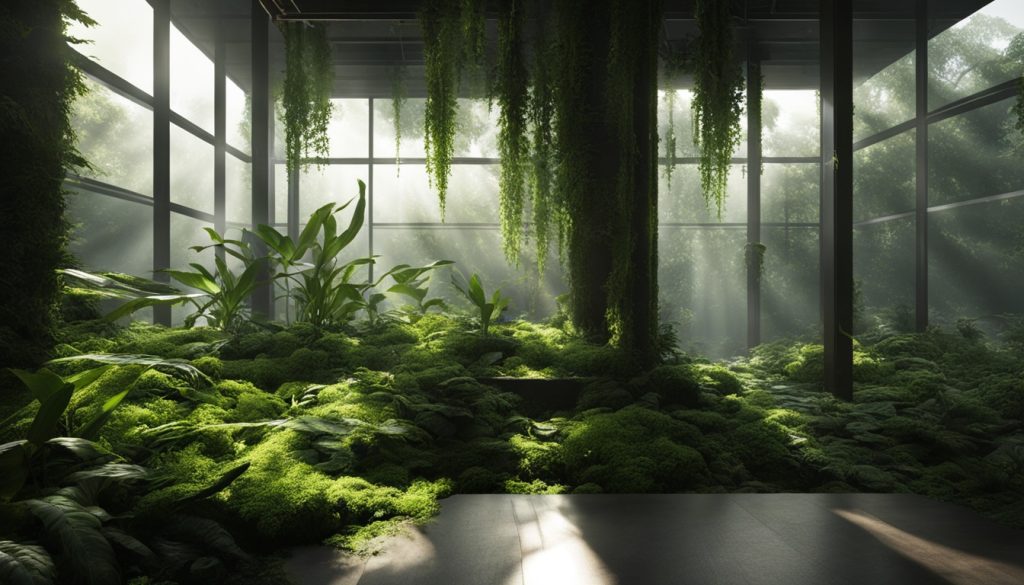
Choosing the right plants is key for your apartment garden’s success and your enjoyment. Think about the light the plants need and how much care they require.
Consider Your Light
The light your space gets affects which plants will do well. Plants that need little light can do great in dark spots. Others need lots of sunlight for hours.
- Low-light plants: Thrive in areas with limited natural light, such as north-facing windows or shaded corners.
- Medium-light plants: Prefer partial or indirect sunlight, like that from east- or west-facing windows.
- Full-sun plants: Require strong, direct sunlight exposure for several hours each day, making them ideal for south-facing windows.
Choose Low-Maintenance Plants
Even easy plants need some care. Think about how much time you have for your plants. If you’re always busy, pick plants that don’t need much attention.
| Plant Type | Maintenance Level | Examples |
|---|---|---|
| Low Maintenance | Minimal watering and care required | Succulents, Snake Plants, ZZ Plants |
| Medium Maintenance | Moderate watering and periodic attention | Pothos, Philodendrons, Chinese Evergreens |
| High Maintenance | Frequent watering, feeding, and monitoring | Bonsai, Orchids, Carnivorous Plants |
Match your plants with your light and lifestyle for a thriving garden. This way, you’ll enjoy your plants without the hassle.
Apartment Gardening For Beginners: Essential Tips
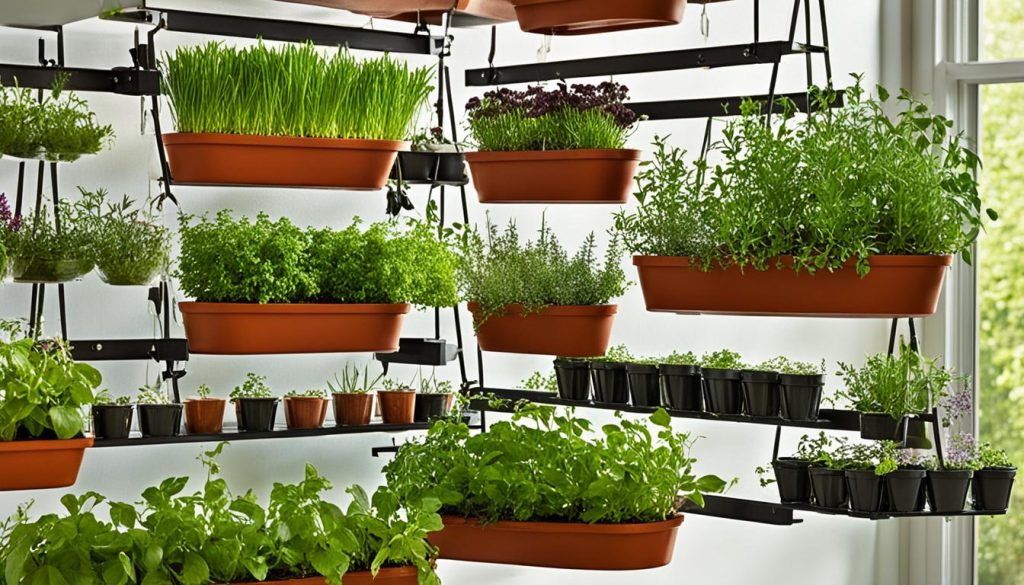
Starting your apartment garden needs careful planning and looking at your space. It’s important to map out your space well for a successful garden.
Map Out Your Space
First, find spots in your apartment for plants, like on bookcases or shelves. Make sure you know how much water your plants need. You’ll need a sink or a tray to hold the water.
Start Small with Succulents
Succulents are great for beginners, no matter where you live. They’re easy to care for, perfect for busy people. Plants like aloe vera and zebra plants need little attention but can bring life to your space.
Consider Your Schedule
Even easy plants need some care. Pick plants that don’t need much attention if you’re always busy. But if you work from home or like staying in, you can try harder plants. They can be very rewarding.
“Mapping out your space and selecting the right plants for your lifestyle are key to creating a thriving apartment garden.”
Creating Your Indoor Garden Oasis
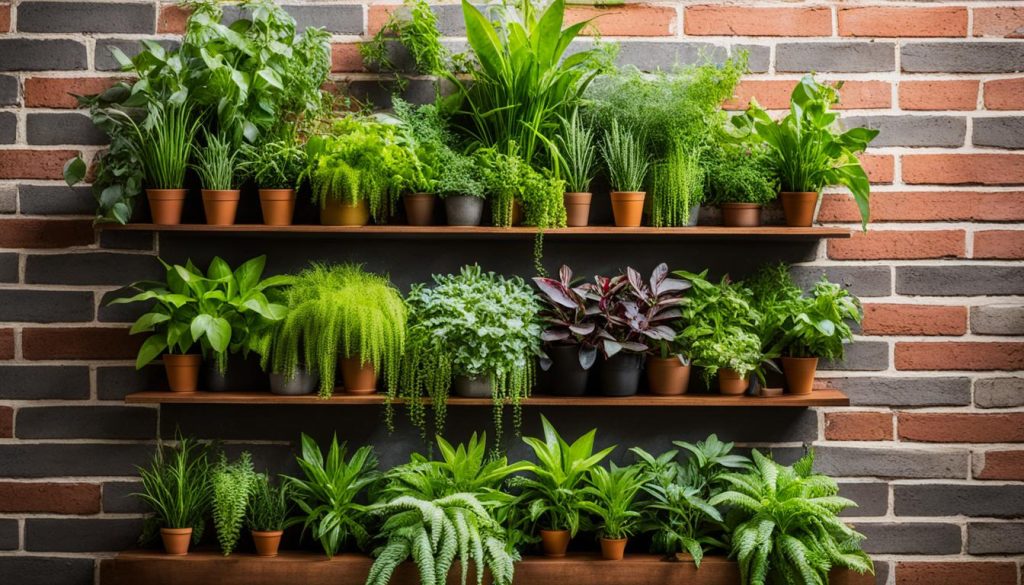
Living in an apartment often means limited space, but you don’t have to give up on gardening. To make a lush, green oasis at home, focus on using vertical space and smart window ledge gardening.
Go Vertical
Vertical gardening is a great solution for small spaces. Attach tall planters to your walls to save floor space and enjoy a green indoor garden. Wall planters and hanging baskets make vertical gardening look good and work well in apartments.
When picking plants, choose ones that are tall and slim and like the light your space gets. Plants like ivy or cascading succulents add charm and depth to your garden.
Utilize Window Ledges
Your apartment’s windows are great for gardening. Turn them into a lively window ledge garden with long planters or small pots. Pick full sun plants that love bright light and turn them now and then for even growth.
Even in small spaces, you can create a beautiful indoor garden. Use vertical gardening and your window ledges well. This way, you get a lush, plant-filled space that’s good for your mind and body.
“Indoor gardening lets you grow fresh herbs and veggies all year. It also lets you grow more plants because you can control things like temperature, sunlight, and humidity.”
Caring for Your Apartment Garden
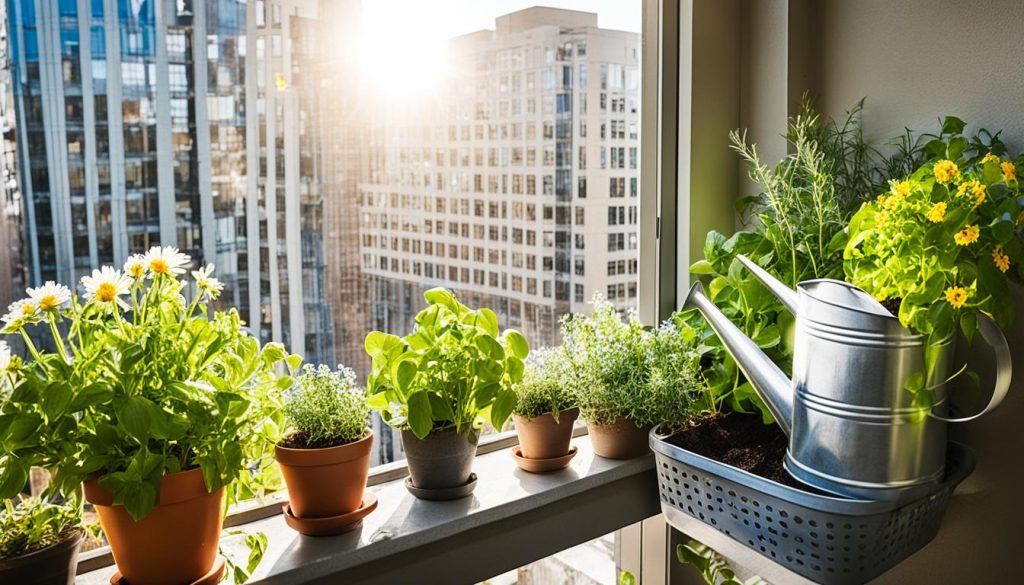
Keeping an apartment garden alive and green takes careful attention. You need to know how much water your plants need and how to keep pests away. With the right care, your indoor garden can stay lush and full of life.
Watering Regimen
Every plant needs different amounts of water. It’s important to water them regularly but not too much. Succulents, for example, store water in their leaves and need less water than leafy greens or herbs. Knowing what each plant needs helps you avoid problems like root rot or wilting.
Pest and Disease Control
Pests and diseases can quickly harm your plants, even indoors. Check your plants often for signs of trouble, like discolored leaves or insects. If you find problems, treat them with insecticidal soap or a suitable fungicide right away. Keeping your plants clean and well-ventilated can also keep pests away.
| Plant Watering Tips | Pest and Disease Prevention |
|---|---|
|
|
By watering your plants right and watching out for pests and diseases, your apartment garden will stay healthy and bright. A bit of care and attention can make your indoor garden a beautiful place to be.
Maximizing Small Spaces for Gardening
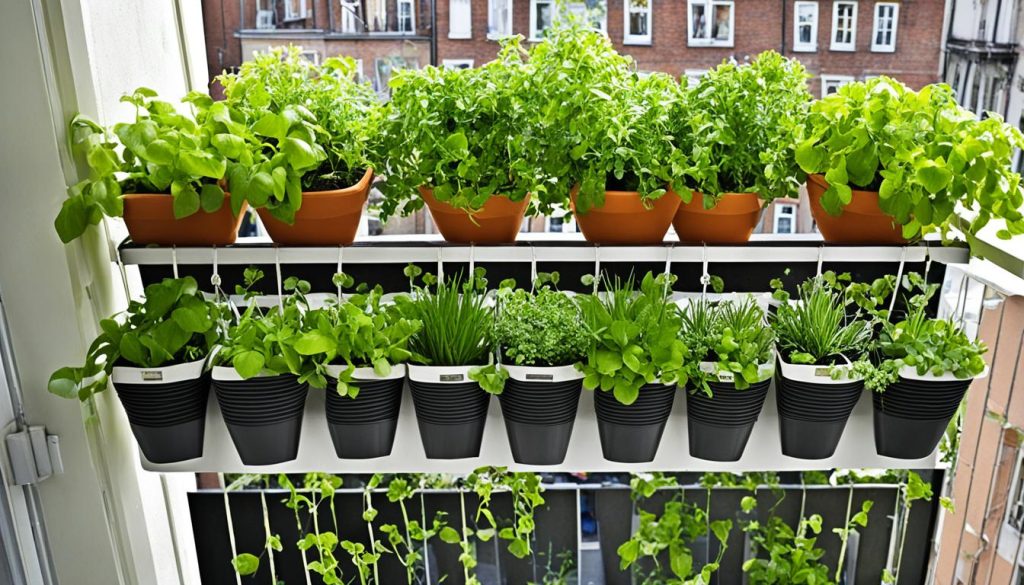
Apartment gardening is not just possible; it’s rewarding, even in small spaces. By using vertical gardening, hydroponic systems, and portable containers, you can turn a tiny balcony or windowsill into a lush oasis.
Vertical Gardening
Vertical gardening is essential for small spaces. Attach vertical planters to walls to increase growing space. Choose slim, tall plants to save space. Wall planters and stacked containers are great for making the most of vertical space.
Hydroponics
The Lettuce Grow Farmstand is a great choice for hydroponic gardening. It’s easy to use, with a built-in water reservoir that connects to a hose. This system lets you grow plants year-round, indoors. Self-watering systems like this make gardening easy.
Portable Containers
Pots with wheels let you move them for the best light. Hanging baskets work well on balconies for herbs and veggies. Mobile planters let you change the garden’s layout easily, making the most of your space.
With creativity and planning, anyone can have a thriving container garden. Enjoy the benefits of vertical gardening and hydroponic systems in your apartment.
Edible Ideas for Compact Gardens
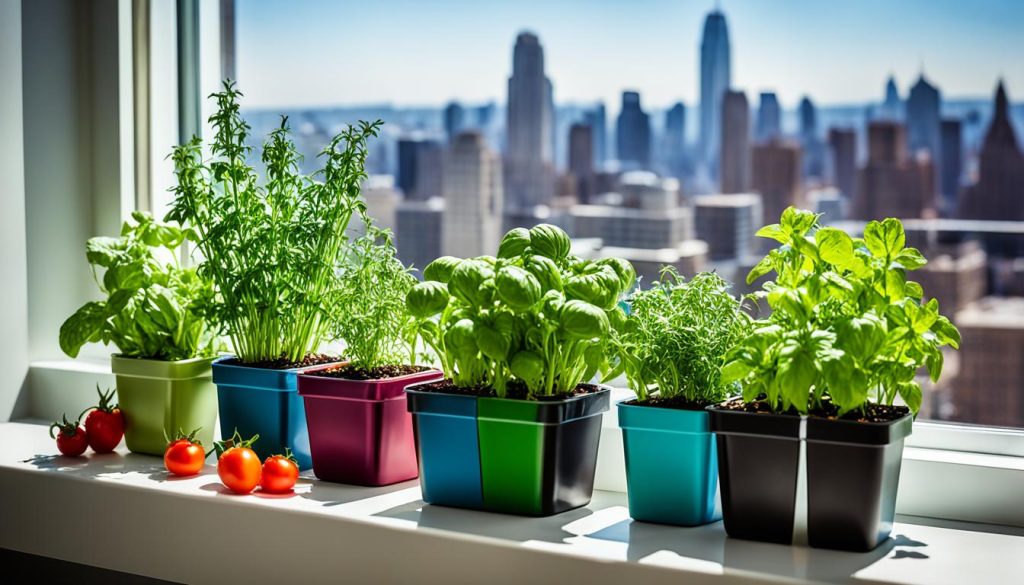
Make your small garden beautiful and full of food! Plant compact vegetables, dwarf fruit trees, and fragrant herbs with flowers in your containers. Mixing edible flowers like calendula, marigolds, and nasturtium will draw beneficial insects, add color, and boost your food supply.
Herbs and Greens
Choose dwarf plant varieties for tight spaces. For example, my “Little Miss Figgy” fig tree does well in a 16″ x 16″ pot and gives big fruits. Mix different vegetables and herbs in one pot to use space well. Basil loves full sun, while lettuce prefers partial shade.
Dwarf Vegetables and Fruits
Compact vegetables and dwarf fruit trees are great for small gardens. Grow bush-type green beans or use trellises to save space. Okra needs a big pot and lots of sun, while peppers do well with lots of fertilizer and water. Zucchini and summer squash need room to spread out. For dessert, try a dwarf citrus tree or strawberry plants.
With creativity and the right plants, even a small space can become a productive and beautiful garden.
“Dwarf doesn’t mean smaller fruit but smaller plant. My fig, for instance, is a Little Miss Figgy which loves growing in the tight space of a 16″ x 16″ pot but produces full sized figs.”
| Compact Plant Variety | Ideal Container Size | Sunlight Needs |
|---|---|---|
| Basil | 12 inches deep | 6-8 hours of sun |
| Lettuce | Window box or deck rail | Partial shade |
| Okra | At least 24 inches wide | Full sun |
| Peppers | 5-gallon bucket | Full sun |
| Strawberries | 8-12 inches deep | Full sun |
Container and Soil Choices
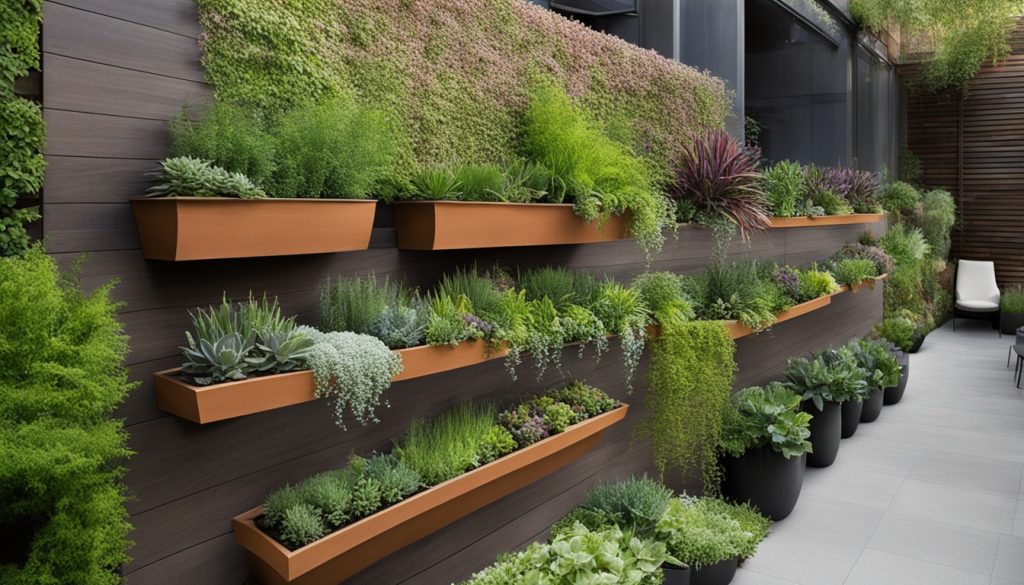
Choosing the right container and soil is key for apartment gardening. Containers filled with soil can get heavy, especially when wet. Make sure your garden spot can handle the weight, especially if it’s on a balcony or rooftop. Window boxes need to be securely attached to the windowsill.
A potting mix that drains well is crucial for containers. Regular garden soil can pack down in pots, cutting off oxygen and preventing water flow. The right container is as important as the soil for your plants’ health and growth.
Exploring Container Options
- Terracotta Pots: A classic choice for container gardening due to healthy root development.
- Plastic Pots: Affordable, lightweight, and retain moisture well, making them suitable for plants that prefer consistently moist soil.
- Ceramic Pots: Less porous than terracotta, available in various styles and colors to add aesthetic appeal to your garden.
- Wooden Planters: Long-lasting choices like cedar and redwood that resist rot and insects.
Importance of Drainage
Good drainage is key to prevent waterlogged roots in containers. Your containers should have enough drainage holes for excess water to escape. This ensures your plants get the right moisture.
| Container Size | Recommended Drainage Holes |
|---|---|
| 4-6 inches in diameter | 3-6 holes, 1/4 inch in size |
| Larger containers | 6-8 holes, 1/4 inch in size |
By picking the right containers and a well-draining mix, you can make a beautiful container garden in your apartment.
“Container gardening has gained immense popularity in recent years due to its benefits in small spaces.”
Conclusion
Apartment gardening lets city folks reconnect with nature and enjoy many benefits, even with limited space. It boosts your health, cleans the air, cuts down on food waste, and links you to the outdoors. With the right plants and smart gardening tips, you can make a beautiful, eco-friendly oasis.
You can grow everything from easy-care succulents to tasty herbs and veggies in small spaces. Use vertical space and new methods like hydroponics to make a garden that improves your living area. With creativity and effort, apartment gardening can be a fulfilling hobby that adds beauty and nature to your life.
Starting small and picking the right plants for your space is key when you begin. There are many online resources, groups, and experts to help you. They’ll guide you in making a lush indoor garden that shows off your style and love for the environment. Enjoy the benefits of city gardening and make your urban life better.
